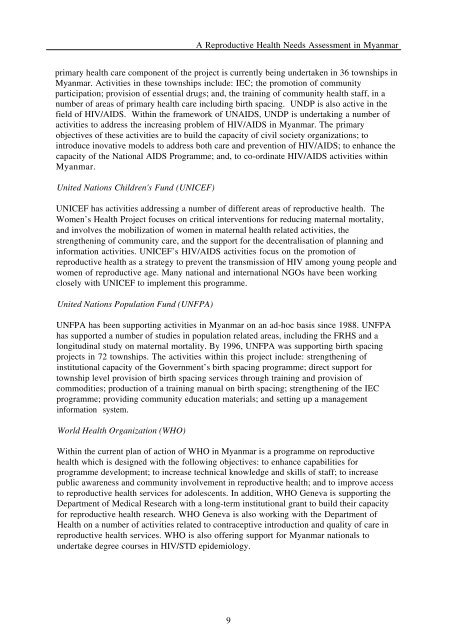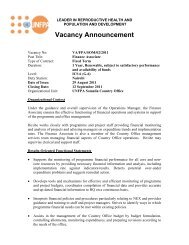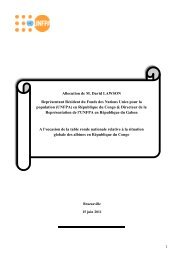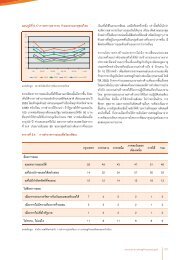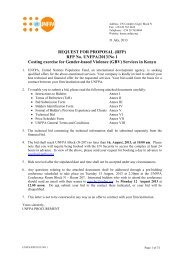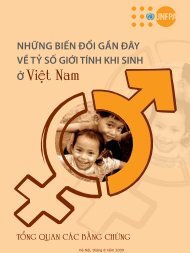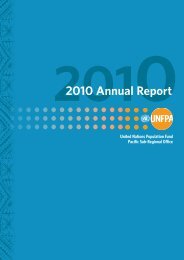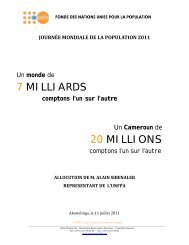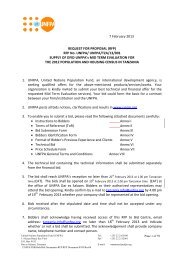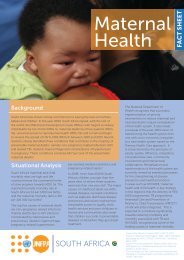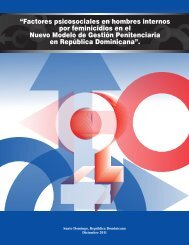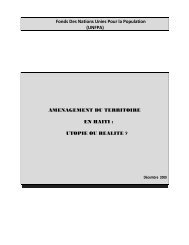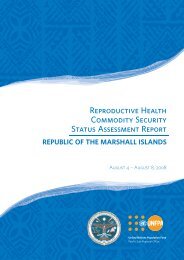A reproductive health needs assessment in Myanmar
A reproductive health needs assessment in Myanmar
A reproductive health needs assessment in Myanmar
Create successful ePaper yourself
Turn your PDF publications into a flip-book with our unique Google optimized e-Paper software.
A Reproductive Health Needs Assessment <strong>in</strong> <strong>Myanmar</strong><br />
primary <strong>health</strong> care component of the project is currently be<strong>in</strong>g undertaken <strong>in</strong> 36 townships <strong>in</strong><br />
<strong>Myanmar</strong>. Activities <strong>in</strong> these townships <strong>in</strong>clude: IEC; the promotion of community<br />
participation; provision of essential drugs; and, the tra<strong>in</strong><strong>in</strong>g of community <strong>health</strong> staff, <strong>in</strong> a<br />
number of areas of primary <strong>health</strong> care <strong>in</strong>clud<strong>in</strong>g birth spac<strong>in</strong>g. UNDP is also active <strong>in</strong> the<br />
field of HIV/AIDS. With<strong>in</strong> the framework of UNAIDS, UNDP is undertak<strong>in</strong>g a number of<br />
activities to address the <strong>in</strong>creas<strong>in</strong>g problem of HIV/AIDS <strong>in</strong> <strong>Myanmar</strong>. The primary<br />
objectives of these activities are to build the capacity of civil society organizations; to<br />
<strong>in</strong>troduce <strong>in</strong>ovative models to address both care and prevention of HIV/AIDS; to enhance the<br />
capacity of the National AIDS Programme; and, to co-ord<strong>in</strong>ate HIV/AIDS activities with<strong>in</strong><br />
<strong>Myanmar</strong>.<br />
United Nations Children's Fund (UNICEF)<br />
UNICEF has activities address<strong>in</strong>g a number of different areas of <strong>reproductive</strong> <strong>health</strong>. The<br />
Women’s Health Project focuses on critical <strong>in</strong>terventions for reduc<strong>in</strong>g maternal mortality,<br />
and <strong>in</strong>volves the mobilization of women <strong>in</strong> maternal <strong>health</strong> related activities, the<br />
strengthen<strong>in</strong>g of community care, and the support for the decentralisation of plann<strong>in</strong>g and<br />
<strong>in</strong>formation activities. UNICEF’s HIV/AIDS activities focus on the promotion of<br />
<strong>reproductive</strong> <strong>health</strong> as a strategy to prevent the transmission of HIV among young people and<br />
women of <strong>reproductive</strong> age. Many national and <strong>in</strong>ternational NGOs have been work<strong>in</strong>g<br />
closely with UNICEF to implement this programme.<br />
United Nations Population Fund (UNFPA)<br />
UNFPA has been support<strong>in</strong>g activities <strong>in</strong> <strong>Myanmar</strong> on an ad-hoc basis s<strong>in</strong>ce 1988. UNFPA<br />
has supported a number of studies <strong>in</strong> population related areas, <strong>in</strong>clud<strong>in</strong>g the FRHS and a<br />
longitud<strong>in</strong>al study on maternal mortality. By 1996, UNFPA was support<strong>in</strong>g birth spac<strong>in</strong>g<br />
projects <strong>in</strong> 72 townships. The activities with<strong>in</strong> this project <strong>in</strong>clude: strengthen<strong>in</strong>g of<br />
<strong>in</strong>stitutional capacity of the Government’s birth spac<strong>in</strong>g programme; direct support for<br />
township level provision of birth spac<strong>in</strong>g services through tra<strong>in</strong><strong>in</strong>g and provision of<br />
commodities; production of a tra<strong>in</strong><strong>in</strong>g manual on birth spac<strong>in</strong>g; strengthen<strong>in</strong>g of the IEC<br />
programme; provid<strong>in</strong>g community education materials; and sett<strong>in</strong>g up a management<br />
<strong>in</strong>formation system.<br />
World Health Organization (WHO)<br />
With<strong>in</strong> the current plan of action of WHO <strong>in</strong> <strong>Myanmar</strong> is a programme on <strong>reproductive</strong><br />
<strong>health</strong> which is designed with the follow<strong>in</strong>g objectives: to enhance capabilities for<br />
programme development; to <strong>in</strong>crease technical knowledge and skills of staff; to <strong>in</strong>crease<br />
public awareness and community <strong>in</strong>volvement <strong>in</strong> <strong>reproductive</strong> <strong>health</strong>; and to improve access<br />
to <strong>reproductive</strong> <strong>health</strong> services for adolescents. In addition, WHO Geneva is support<strong>in</strong>g the<br />
Department of Medical Research with a long-term <strong>in</strong>stitutional grant to build their capacity<br />
for <strong>reproductive</strong> <strong>health</strong> research. WHO Geneva is also work<strong>in</strong>g with the Department of<br />
Health on a number of activities related to contraceptive <strong>in</strong>troduction and quality of care <strong>in</strong><br />
<strong>reproductive</strong> <strong>health</strong> services. WHO is also offer<strong>in</strong>g support for <strong>Myanmar</strong> nationals to<br />
undertake degree courses <strong>in</strong> HIV/STD epidemiology.<br />
9


